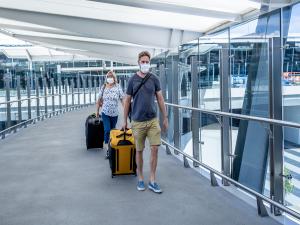
by David Young, PA
Northern Ireland’s Health Minister Robin Swann has warned that foreign holidays are “very much” out this summer.
Mr Swann also expressed concern about the potential of a further surge in cases in the region and the consequences that would have across the region’s under-pressure health system.
The Health Minister said administrations across the UK and Ireland were having discussions about drawing up a red list related to foreign countries posing the highest Covid risks.
Asked at his weekly coronavirus media briefing at Stormont whether foreign travel was out in regard to summer holidays, the minister said: “I would say very much so.”
Mr Swann noted the steps being taken in England to fine people taking unnecessary overseas trips but he said similar action was not being considered by the Stormont Executive.
“It’s not a direction of travel that we would be going on at this point in time in the Executive,” he said.
There are currently no direct international flights in and out of Northern Ireland.
Mr Swann said an Executive task force continued to draw up plans for hotel quarantining arrangements for international travellers in the future.
The minister also suggested the Executive might have to restrict cross-border travel on the island of Ireland as Northern Ireland emerges from lockdown, given the slower rate of vaccination in the Irish Republic.
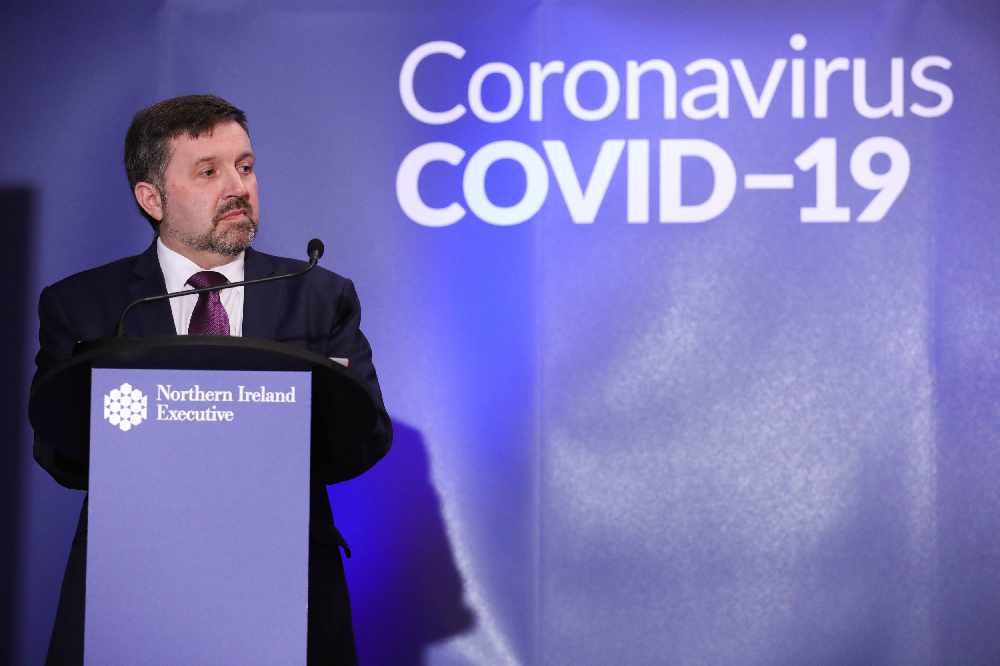
Health Minister Robin Swann
He said the disparity in rates would not affect his advice to ministerial colleagues on how fast society opened up north of the border, but he added: “What it may influence is advice and guidance that we may give on interjurisdictional interactions as to how that could be potentially looked at in the future as well.
“Because what we don’t want to see is the risk of further Covid outbreaks or, indeed, different variants even entering Northern Ireland once we progress with our vaccine programme at the rate we are currently doing.”
At the briefing, the head of Northern Ireland’s vaccine rollout, Patricia Donnelly, said the region was on course to have all adults (1.4 million) offered a first dose by July.
Dr Donnelly said while the vast majority of people were engaging appropriately with the programme, she warned of some level of abuse, expressing concern about double bookings of appointments or ineligible people trying to secure jabs.
She made clear anyone who was not eligible for a jab would be turned away.
The head of the vaccine roll out in Northern Ireland has appealed to people not to abuse the online booking system.
— Q Radio News (@qnewsdesk) March 24, 2021
📍 Don’t book multiple appointments
📍 Don’t be a no show
📍 Don’t book if you are not eligible pic.twitter.com/lXxrWnsx8X
It emerged on Wednesday that for a period on Tuesday some ineligible people were able to book appointments on the system due to a technical glitch. Those appointments are being cancelled.
Asked about the prospect of the EU restricting the export of supply to the UK, Mr Swann said he and his officials always kept a “watchful eye” on supply lines.
However, he stressed that Northern Ireland would be using vaccines bought from around the world.
“It’s not just about supplies coming from Europe, we’re now looking at a worldwide vaccine supply programme and being part of the UK buying power where we actually pre-bought seven different vaccines I think stands Northern Ireland in good stead for future supplies,” Mr Swann said.
He highlighted that he expected the Moderna vaccine to be in use in Northern Ireland within weeks.
Mr Swann said the vaccination programme offered the hope of “better times ahead” with “more freedoms and more normality”.
“We cannot jeopardise that better future by being reckless now,” he said.
“We have so much work to do, both in terms of combating the virus and repairing the great damage it has caused.
“Rebuilding health services post-pandemic is a top priority of mine, particularly the need to address the backlog in operations and other treatments.
“The potential for a further surge in Covid-19 cases, however, represents the single biggest threat to that crucial rebuilding.”
At the briefing, the region’s chief medical officer Dr Michael McBride was asked whether officials were concerned about early data suggesting the AstraZeneca jab might not be as effective against the South African variant of Covid.
Dr McBride said medical experts constantly monitored the safety and efficacy of vaccines.
“Variants are just going to be a fact of life,” he said.
“We will see new variants arise and they will arise most quickly where the virus is dividing most rapidly.
“In terms of how effective the vaccines are and whether some of these variants escape from the vaccines, what we do know at this point in time is that the vaccines that we are using may not provide full protection, but even with those variants that are in circulation should provide protection from severe disease and death.
“If, however, we need to change the vaccines, the public should be reassured that that work is ongoing and that now we have these vaccines produced that actually can be taken forward very, very quickly in a matter of weeks to months.
“Whether we will require booster doses of different or tweaked vaccines in future is still to be decided.”
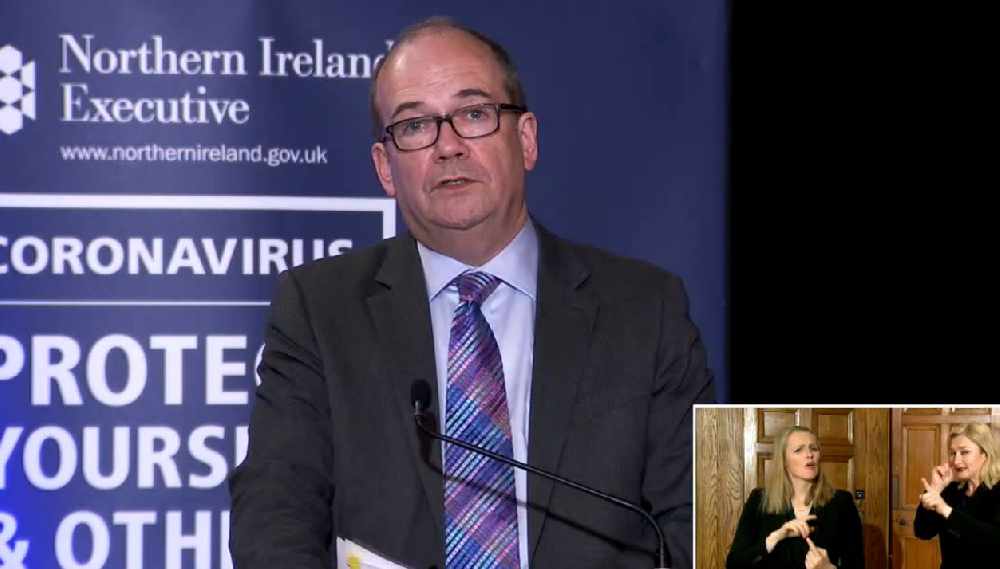
Chief Medical Officer Dr Michael McBride
There were no further deaths of patients who previously tested positive for Covid-19 announced in Northern Ireland on Wednesday. Another 139 confirmed cases of the virus were recorded by the Department of Health.
Dr McBride welcomed the falling death rate but cautioned that infection rates were “higher than we would like”.
“Things are improving,” he said.
“The short-term trajectory however remains uncertain as we ease our way out.”
Dr McBride also announced that official advice to those considered clinically extremely vulnerable would be eased on April 12.
Since December, people in that category were told not to attend work, even if they could not work from home.
From April 12, the advice will allow them to return to a workplace, if they cannot work from home, as long as adequate safety provisions are in place.


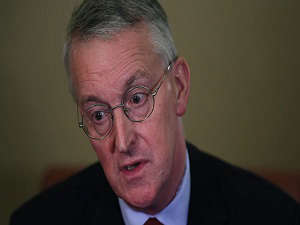 Government announces Stormont Brake will not be pulled over change of EU law
Government announces Stormont Brake will not be pulled over change of EU law
 A man assaulted with hammer during robbery in South Belfast
A man assaulted with hammer during robbery in South Belfast
 Finance Minister makes 20-month Civil Service pay offer
Finance Minister makes 20-month Civil Service pay offer
 Firefighters tackle large fire at Coleraine recycling plant
Firefighters tackle large fire at Coleraine recycling plant
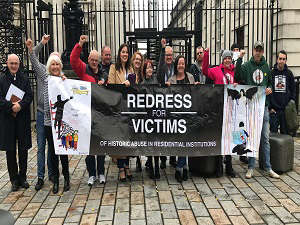 Institutional abuse survivors urged to come forward before deadline passes
Institutional abuse survivors urged to come forward before deadline passes